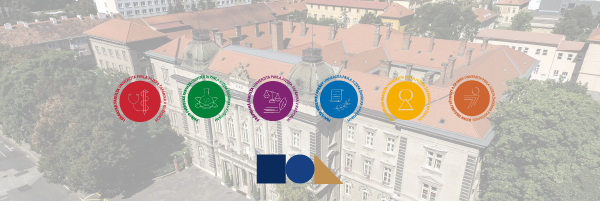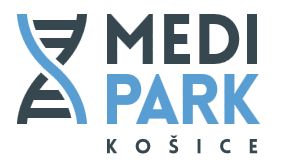The graduate of the third cycle of higher education in the field of Biochemistry gains knowledge of scientific methods of biochemistry which is able to use in creative way in different interdisciplinary branches (medical chemistry, biochemistry, pharmacology, theoretical medicine, and clinical biochemistry). He is able to use theories and practical application of the newest interdisciplinary sciences in the field of medical chemistry, biochemistry and clinical biochemistry.
The graduate gains knowledge in research, he is actively using methods of scientific research, he is able to publish and to present the results of his research. During the studies, the graduate gains also social, ethical, environmental and legal aspects of research work.
The graduate of the third cycle of higher education in the branch of Normal and pathological physiology gains information s about methodology of experimental medicine and of evidence based medicine. He knows to assess critically the knowledge gained from the literature and on the based of studying material propose his own solution of the problem.
During the doctoral studies, the graduate gains the basic knowledge of didactics in normal and pathological physiology, of modern ways in teaching of pre- and postgraduate medicine.
The graduate of the third cycle of higher education in the branch of Internal diseases gains information about scientific methods and research in the field of internal diseases or in the fields related to the internal diseases including cardiology, angiology, gastroenterology, hepathology, nephrology, endocrinology, diabetilogy, pneumonology, reumatology, hemathology, infectology, medical genetics, clinical oncology, etc. The graduate can provide independent research work and he is proposing his own solution of problems in the field of internal diseases. The graduate gains knowledge in research, he is actively using methods of scientific research, he is able to publish and to present the results of his research.
The graduate of the third level of studies in the branch of Epidemiology gains knowledge about scientific methods of research in the realm of epidemiology and he is able to name and to analyze actual epidemiological problems related with infectious and chronic diseases. The graduate gains knowledge of basic research work, of work with scientific literature including literature in electronic form. He is able to formulate and to verify working hypothesis using mathematical and statistical analyses.
The graduate of the third cycle of higher education in the branch of Hygiene gains knowledge of scientific methods which is able to apply for solving of wide spectrum of problems in the field of following medical branches physiology, pathological anatomy and physiology, immunology, epidemiology, social medicine and bioinformatics. He knows methods and practical application of the newest interdisciplinary sciences in the branch of preventive medicine. The graduate gains knowledge in research, he is actively using methods of scientific research, he is able to publish and to present the results of his research. He can also actively participate in research programs in the frame of European research program. During the studies, the graduate gains also social, ethical, environmental and legal aspects of research work.
The graduate of the third cycle of higher education in Surgery gains basic knowledge in the respective field of study. He is able to formulate the scientific problem, to judge the ethic side of his research as well as to plan and realize his project. The graduate knows the scientific methods of experimental and clinical research, he is solving the scientific problems. He is able to interpret correctly the gained data and use them in the practice. He can also actively participate in research programs in the frame of European research program. Together with his supervisor, he should participate actively in development of the department.
The graduate of the third cycle of higher education in Pediatrics is able to work independently and to propose his own solutions of problems in the field of pediatrics. He knows scientific methods of research and development in pediatrics. The graduate takes part at multidisciplinary scientific activities. He is able to identify the main problems in the context of dynamics of demagrafical, social, economical and environmental conditions in the population. With his scientific, pedagogical, publishing activities the graduate is able to attribute to the development of pediatrics.
The graduate of pediatrics has:
-
to acquire the basic knowledge about changes in growth and development and their clinical application from the birth to puberty;
-
to develop the competencies in medical examination of nursling, children and adolescents;
-
to gain necessary information on diagnostic and treatment of the most frequent acute and chronic diseases;
-
to understand influence of the family, community to the children;
-
to develop strategy for supporting the health as well as prevention of diseases and accidents;
-
to develop communicative skills to improve clinical interaction with children, adolescents and their parents as well as to ameliorate pedagogical work with students of medicine;
-
to develop his capacity to identify and to solve various clinical problems.
The graduate of the third cycle of higher education in Psychiatrics is able, in the context of actual problems in his field of study, to formulate hypothesis, to find out scientifically relevant methods of testing and he is able to publish the results of his work. He can appropriately consider the results of his research in the context of his field of study.
The graduate of the third cycle of higher education in Otorhinolaryngology gains deep theoretical knowledge about temporary state in otorhinolaryngology and in the related branches. The graduate knows the methods of clinical work, of the scientific research, of data collection, of data analysis and their following interpretation. With the results of his work he contributes to development of otorhinolaryngology. He is able to transpose his scientific results to the clinical application, to the lectures and to his publishing work. The graduate contributes with his own solutions of problems in otorhinolaryngology.
The graduate of the third cycle of higher education in Pharmacology gains knowledge about scientific methods of pharmacology, which is able to apply with creativity for solving wide spectrum of problems related to the sciences about man as a part of the nature (physiology, patophysiology, molecular biology, biochemistry, pharmacology, immunology, and pathology). He knows the newest methods and their practical application in the branches mentioned above. He is able to transpose his scientific results to the clinical application, to the lectures and to his publishing work. He can also actively participate in research programs in the frame of European research program.













